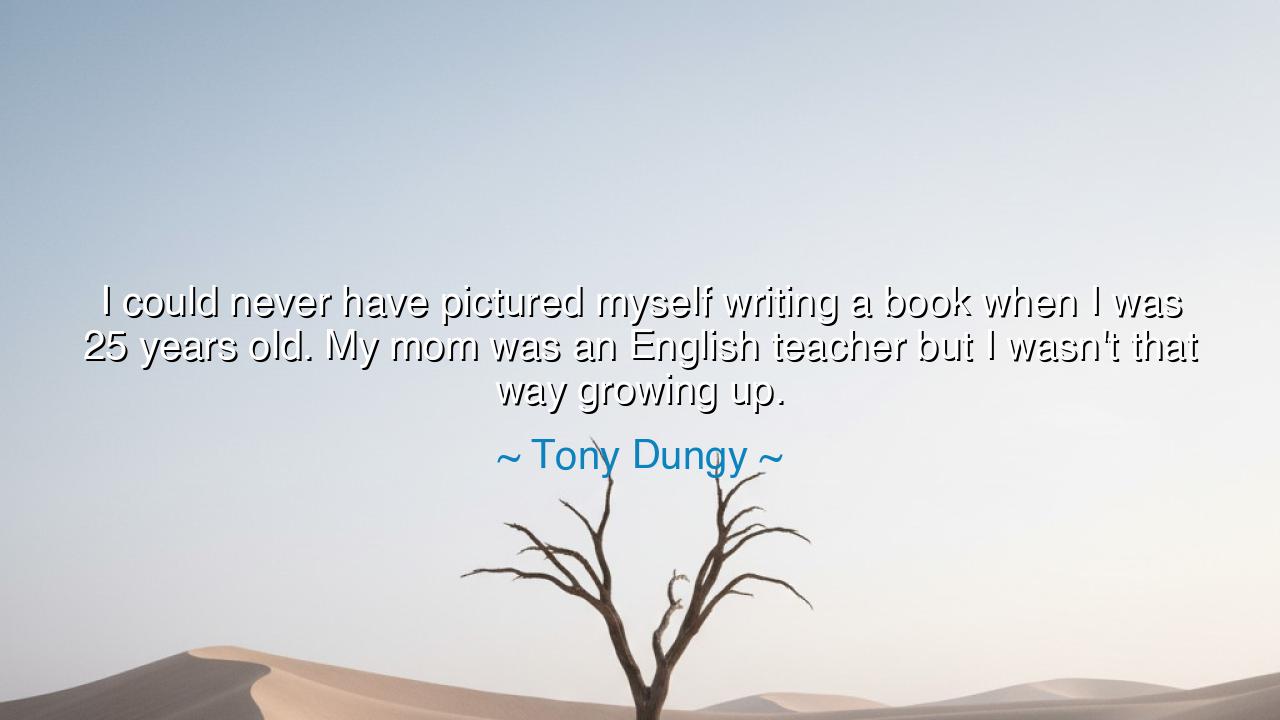
I could never have pictured myself writing a book when I was 25
I could never have pictured myself writing a book when I was 25 years old. My mom was an English teacher but I wasn't that way growing up.






The words of Tony Dungy—“I could never have pictured myself writing a book when I was 25 years old. My mom was an English teacher but I wasn't that way growing up”—are a testimony to the mystery of growth and the unexpected paths of destiny. They remind us that who we are in youth does not confine who we may become, and that the seeds planted in us by those who love us often bear fruit only in their appointed season. For even when we wander from the ways of our parents, or fail to see within ourselves the gifts they hoped to nurture, those early influences remain, waiting for the right time to awaken.
The origin of this wisdom lies in the contrast Dungy draws between his mother’s vocation and his own early indifference. His mother, an English teacher, embodied the love of words, language, and learning. Yet as a young man, Dungy did not share her passion. He was not “that way,” not the studious writer or lover of books. Instead, his heart belonged to the field of athletics, where he would find success and leadership. And yet, years later, the discipline, thoughtfulness, and influence of his upbringing would guide him to the very act he once could not imagine—writing. His words remind us that we often grow into parts of ourselves that once seemed foreign.
History offers many such examples. Consider Winston Churchill, who as a child struggled with schoolwork and was dismissed as inattentive. Few would have imagined that this boy, scolded by his teachers, would later become one of history’s greatest orators and writers, even winning the Nobel Prize in Literature. Just as Dungy could not imagine himself writing, Churchill’s early years gave no sign of the eloquence he would one day command. Their stories declare that early weakness does not dictate final destiny, and that transformation often arises when least expected.
The emotional force of Dungy’s reflection lies in its humility. He admits that as a young man, he could not picture himself as an author. This admission is not defeat, but inspiration: it reminds us that our present limitations are not permanent. The greatness of tomorrow may grow out of the soil of today’s inexperience. And the influence of others—especially parents and teachers—may shape us long after we think we have left their lessons behind. His mother’s vocation as a teacher did not bear fruit in him at 25, but it quietly laid a foundation that would guide him when the time was right.
There is also something deeply heroic in this teaching. For it tells us that life is not bound by youthful self-perception. Many believe that if they do not discover their calling by a certain age, they never will. Dungy’s words prove the opposite: destiny often unfolds with patience, revealing gifts long dormant. The young man who could not see himself as a writer became the older man whose wisdom filled books, inspiring countless lives. In this way, he embodies the truth that perseverance, humility, and openness to growth can lead us into futures greater than we ever imagined.
The lesson for us is plain: never limit yourself to the boundaries of what you see in your youth. You may not yet be the scholar, the leader, the artist, or the writer you will one day become. Seeds planted by parents, teachers, and mentors may lie hidden for years, only to spring forth when the heart is ready. What matters is not whether you are “that way” now, but whether you remain open to becoming more than you thought possible.
What, then, shall we do? Let us be patient with ourselves, trusting that growth may come late but will come in its season. Let us honor the unseen influence of those who taught us, even when we did not seem to listen. Let us remain open to change, willing to step into roles we once thought impossible. And above all, let us encourage others—not to despair if they are not “that way” today, but to believe that life may yet reveal new gifts tomorrow.
Thus, Tony Dungy’s words endure as a testament to the power of growth, humility, and hidden influence. The young man who could not imagine writing became the man who wrote. And so it may be with us all: what we cannot picture today may become the very gift through which we bless the world tomorrow.






AAdministratorAdministrator
Welcome, honored guests. Please leave a comment, we will respond soon